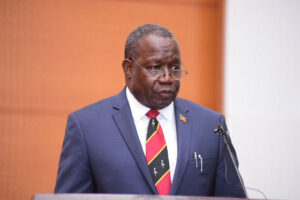Karuma Commissioning: Renewing Hope for Reliable Electricity
The commissioning of Karuma gave Ugandans hopes of having access to reliable and affordable electricity.

Op-Ed: as the government prioritized increasing Uganda’s power production, on September 26, the president of Uganda commissioned a 600 MW Karuma hydropower station, which is expected to increase nearly to 2,000 megawatts.
President Museveni during the commissioning noted that the country’s target is to have enough electricity at a low cost and emphasized the importance of reliable and affordable electricity for Uganda’s economic development.
He further highlighted some historical facts regarding the progress of Uganda’s electricity sector and the story behind the journey of connecting all Ugandans to the national grid.
The commissioning of Karuma gave Ugandans hopes of having access to reliable and affordable electricity.
Although the commissioning of the 600 MW Karuma hydropower has been heralded by many as a significant step towards economic enhancement in Uganda, this ambitious project raises critical questions about its real benefits for the local population. The truth is that many Ugandans will remain largely disconnected because the challenge of affordability as well as connecting communities to this high-voltage network remains daunting.
Notably, for over three decades, the government has boasted Uganda’s electricity sector, playing a big role in driving the socio-economic development of the country through investing trillions of shillings in Uganda’s electricity sector. It is noted that currently, the total installed power stands at 1,847.5 MW.
Unfortunately, this generated electricity remains wasted, costing poor Ugandan taxpayers’ money where less than 1000 MW are consumed during peak hours and over 800 MW remain deemed. This explains why the government has spent over UGX 1.4 trillion for deemed power.
Like any other project, the Karuma hydropower station comes at a time when Ugandans have failed to see benefits of previous electricity programs such as the Rural Electrification program, the Free Electricity Connection Policy, the two Rural Electrification and Strategic Plans (RESPs), the Electricity Access Scale Up project (EASP), hydro mini-grids and dams like Isimba and Bujagali, among others, all seeking to extend power access to the rural communities and increase accessibility to Ugandans.
However, despite all these government’s electricity initiatives, Ugandans still face the energy challenges even after the commissioning of the Karuma hydropower dam, whereby 94% of Ugandans still depend on biomass as the major source of energy, which is a key global challenge towards environmental protection and reversing the current trend of climate change effects.
The reliance on biomass is caused by many factors, including unreliable power, high power tariffs, and deemed power, among others. This explains why the few remaining forests are under threats for firewood collection and charcoal burning.
This means that however much the government constructs many hydropower dams, without tackling these issues affecting the energy sector, Ugandans are likely to continue suffering depending on biomass. This creates a paradox where the infrastructure that is intended to drive economic growth of Ugandans has instead become an additional burden, which is further entrenching poverty instead of alleviating it, especially in rural communities.
Notably, ERA recently announced that the July to September 2024 power tariffs for domestic consumers are UGX 803.0 from UGX 819.4, commercial consumers to UGX 606.2 from UGX 615.9, medium-industrial consumers to UGX 452.1 from UGX 459.8, large-industrial consumers to UGX 383.4 from UGX 388.5, and extra-large consumers.
However, if the service fee and value-added taxes (VAT) are added to the above prices, the domestic consumers pay about UGX 1000 per unit, yet over 30.1% of Ugandans live below the poverty line. The government must ensure that the tariffs imposed on Ugandans are relevant and reflect their financial realities.
Additionally, the signing of Power Purchase Agreements (PPAs) and other contracts has made the government enter into dubious agreements that have already caused a loss of hundreds of millions of dollars to Uganda and other long-term implications in the electricity sector, including delays in project development, high return on investments, and corruption, among others. This has also led to concerns by Ugandans about the government’s balance of the interests of private investors and the affordability of electricity to consumers.
More so, production of deemed power is among the reasons why electricity power prices remain high. Uganda’s total installed capacity currently stands at over 1,847 MW; however, less than 1000 MW are consumed at peak, and the government continues to pay for the excess power that Ugandans are not benefiting from.
The excess power that is being produced has increased as dams such as Achwa II, Isimba, and Karuma dams and others were launched after the date of completion.
Therefore, the government must ensure improvements in Uganda’s electricity supply, addressing issues of reliability and affordability and inspiring optimism for a brighter energy future after the commissioning of these hydropower projects, such as Karuma and Bujagali, among others.
The government must as well prioritize off-grid clean energy for Ugandans, reject tax exemptions for energy developments, make agreements for electricity projects transparent to ensure value for money, and reduce the power tariffs in order to ensure all Ugandans get access to affordable and reliable electricity.
The author is Olive Atuhaire, Research Associate.
Disclaimer: As UG Reports Media LTD, we welcome any opinion from anyone if it’s constructive for the development of Uganda. All the expressions and opinions in this write-up are not those of UG Reports Media Ltd. but of the author of the article.
Would you like to share your opinion with us? Please send it to this email: theugreports@gmail.com.






